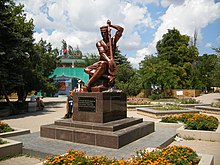Aşıq Ümer
Ümer Abdula oğlu | |
|---|---|
 Statue of Ashik Umer in Yevpatoria (former Kezlev — his birth-place) | |
| Born | 1621 Kezlev, Crimean Khanate |
| Died | 1707 Kezlev, Crimean Khanate |
| Pen name | Aşıq Ümer, Ümer Kezlevli |
| Nationality | Crimean Tatar |
| Citizenship | Crimean Khanate |
| Genre | ashik poetry, bağlama poetry, ghazal, rubaʿi |
| Subject | mystical content, soldier's theme |
Ashik Umer (Crimean Tatar: Aşıq Ümer; 1621, Kezlev — 1707, Kezlev) was a Crimean Tatar medieval poet-ashik, one of the most famous representatives of the Turkic-speaking ashik poetry in general. Ashik poetry (Crimean Tatar: aşıq — the person in love) is a special kind of literary oeuvre, the representatives of which — folk poets-singers — accompany their performances with playing the string-plucked musical instrument bağlama. Hence another name for this poetry — "bağlama poetry".
He wrote mainly lyric poems (on mystical content and related to a soldier's theme) in the forms of Turkic folk poetry. Ashik Umer is also an author of the poems that are traditional for classical oriental poetry — ghazals, rubaʿi etcetera. He greatly influenced the later poets-improvisers (ashiks).[1][2]
References[]
- ^ Ашик Омер. Краткая литературная энциклопедия. Т. 1. — 1962 (in Russian)
- ^ Mustafa Altuğ Yayla Yüzyıl osmanlı imparatorluğunda aşık ömer ve popüler kültür — Hacettepe Üniversitesi Sosyal Bilimler Enstitüsü // Ankara, 2013 (English: YAYLA, Mustafa Altuğ. Aşık Ömer and Popular Culture in 17th Century Ottoman Empire, Master Thesis, Ankara, 2013)
Sources[]
- Ergun, Sadettin Nüzhet, Aşık Ömer. Hayatı ve şiirleri, Istanbul, 1936; Banarlı, Nihat Sami, Resimli Türk edebiyatı tarihi, Istanbul, 1949.
- Ашик Омер. Краткая литературная энциклопедия. Т. 1. — 1962
- Ашик Умер – самый известный в мире крымский певец любви — Крым.Реалии // RFEL
- Mustafa Altuğ Yayla Yüzyıl osmanlı imparatorluğunda aşık ömer ve popüler kültür — Hacettepe Üniversitesi Sosyal Bilimler Enstitüsü // Ankara, 2013
- Crimean Tatar writers
- Crimean Tatar poets
- 1621 births
- 1707 deaths
- Poet stubs
